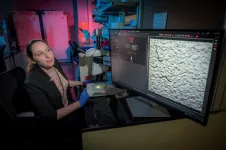(Press-News.org) Are our pets leaking information about us?
Pet and animal-related apps are creating cybersecurity risks to their owners, new research has shown.
While being able to trace your cat and dog may be an attractive benefit to many pet owners as it can provide peace of mind, allowing a third party to track your movements may be much less attractive.
Computer scientists at Newcastle University and Royal Holloway, University of London have exposed multiple security and privacy issues by evaluating 40 popular Android apps for pets and other companion animals as well as farm animals. The results show that several of these apps are putting their users at risk by exposing their login or location details.
Password vulnerability was one of the areas exposed by the team. They identified three applications that had the user's login details visible in plain text within non-secure HTTP traffic. This means that anyone is able to observe the internet traffic of someone using one of these apps and will be able to find out their login information. In addition to login information, two of the apps also showed user details, such as their location, that may enable someone to gain access to their devices and risk a cyber-attack.
Another area of concern identified in the study was the use of trackers. All but four of the applications were found to feature some form of tracking software. A tracker gathers information on the person using the application, on how they use it, or on the smartphone being used.
The scientists also warn that the apps perform very poorly in terms of notifying the user of their privacy policy. Their analysis shows that 21 of the apps are tracking the user in some way before the user even has a chance to consent to this, violating current data protection regulations.
The study was led by Newcastle University and the Royal Holloway, University of London and presented at the 2022 IEEE European Symposium on Security and Privacy Workshops conference.
Scott Harper is a PhD student at Newcastle University’s School of Computing and the lead author of the study. He said: “Pet tech such as smart collars and GPS trackers for your cat or dog, is a rapidly growing industry and it brings with it new security, privacy, and safety risks to the pet owners.
“While owners might use these apps for peace of mind about the health of their dog or where their cat is, they may not be happy to find out about the risks the apps hold for their own cybersecurity.
“We would urge anyone using these apps to take the time to ensure they are using a unique password, check the settings and ensure that they consider how much data they are sharing or willing to share.”
Pet tech, the technology in the pet care industry to improve the health, wellbeing, and overall quality of life of pets, is growing rapidly and includes a wide range of products, including GPS trackers, automatic feeders and pet cameras.
Examples of pet tech include wearable devices that monitor a pet's activity levels, heart rate, and sleep patterns, as well as smart feeding systems that dispense food on a set schedule or in response to the animal's behaviour. There are also apps and platforms that allow owners to track and manage their pets' health records and connect with veterinary professionals.
Co-author, Dr Maryam Mehrnezhad, from the Department of Information Security at Royal Holloway, University of London, added: “We are using modern technologies to improve several aspects of our lives. However, some of these (often) cheap technologies come at the price of our privacy, security, and safety. Animal technologies can create complex risks and harms that are not easy to recognise and address. In this interdisciplinary project, we are working on solutions to mitigate such risks an allow the animal owners to use such technologies without risk or fear.”
A second study by the research team included a survey of almost 600 participants from the UK, USA and Germany. The researchers asked questions about the technologies used, incidents that have occurred or participants believe may occur, and the methods used by participants to protect their online security and privacy and whether they apply these to their pet tech.
Published in the journal Proceedings of the 12th International Conference on the Internet of Things, the findings show that participants do believe that a range of attacks may occur targeting their pet tech. Despite this, they take few precautions to protect themselves and their pets from the possible risks and harms of these technologies.
Co-author, Dr Matt Leach, Director of Comparative Biology Centre, Newcastle University added:
“We would urge those developing these technologies to increase the security of these devices and applications to reduce risk of their personal information or location being shared.”
The researchers urge those who are using pet tech, to ensure they are using a unique password only for that app, check the settings and consider what data they are sharing. Users should be cautious about any new IoT devices they bring into their home. They should download apps associated with animal tech from known app stores and constantly check the permissions of such apps and revoke any unnecessary permission from them. Guides such as Mozilla's `*Privacy Not Included' project are available to help inform consumers on the potential security and privacy risks.
--ends--
Reference
S. Harper, M. Mehrnezhad and M. Leach, Are Our Animals Leaking Information About Us? Security and Privacy Evaluation of Animal-related Apps, IEEE European Symposium on Security and Privacy Workshops (EuroS&PW), 2022, doi: 10.1109/EuroSPW55150.2022.00012.
S. Harper, M. Mehrnezhad, and M. Leach, Security and privacy concerns of Pet Tech Users. Proceedings of the 12th International Conference on the Internet of Things (IoT Workshop), 2022, doi.org/10.1145/3567445.3571102
END
Are our pets leaking information about us?
2023-02-28
ELSE PRESS RELEASES FROM THIS DATE:
Experts demand fire safety policy change over health impact of widely used flame retardants
2023-02-28
Leading environmental health experts have called for a comprehensive review of the UK's fire safety regulations, with a focus on the environmental and health risks of current chemical flame retardants.
The health dangers of substances meant to improve fire safety have prompted experts to demand a range of new measures to reduce risk.
Flame retardants are widely used to slow down or stop the spread of fire. They are used regularly in a range of products – from sofas and textiles, to building materials. However, hundreds of studies have reported on the adverse effects of these chemicals, many of which are bioaccumulative and have been linked ...
Loneliness is central to perinatal depression
2023-02-28
Loneliness can often contribute to depression in expectant and new mothers, finds a new review of evidence led by UCL researchers.
The researchers say people working with expectant mothers, such as in antenatal classes or consultations, should be aware of the importance of loneliness and the value of encouraging new mothers to develop and maintain good social connections. The findings suggest that increased support from family and healthcare professionals can be helpful in reducing the mental health impacts of loneliness.
Published in BMC Psychiatry, the meta-synthesis (an evidence review using a systematic ...
Obesity in pregnant women could alter the structure and function of the placenta increasing the risk of poor health outcomes for both mother and baby
2023-02-28
Maternal obesity alters the structure of the placenta (a vital organ that nourishes the baby during pregnancy) more than gestational diabetes mellitus (GDM; a condition is diagnosed by poor glucose control in pregnancy). The new insight, published in The Journal of Physiology, enhances understanding about the mechanisms underlying poor pregnancy outcomes and the subsequent greater risk of poor neonatal and offspring health. The identification of specific changes in the placenta could lead to the potential development ...
Australia’s rarest bird of prey disappearing at alarming rate
2023-02-28
Australia’s rarest bird of prey - the red goshawk - is facing extinction, with Cape York Peninsula now the only place in Queensland known to support breeding populations.
PhD candidate Chris MacColl from The University of Queensland’s School of Earth and Environmental Sciences led the research project that made the discovery and was shocked by the hawk’s dwindling numbers.
“Over four decades the red goshawk has lost a third of its historical range, which ...
Local leaders announce plan to strengthen health services in Imperial County
2023-02-28
Representatives from the City of El Centro, El Centro Regional Medical Center (ECRMC), and UC San Diego Health today announced a strategic and operational plan to stabilize and financially bolster ECRMC, as well as the greater network of Imperial County hospitals.
Under the proposed 12- to 18-month plan, UC San Diego Health will assume full day-to-day operational, clinical and financial management of ECRMC while Preston Hollow Community Capital (PHCC), the majority bondholder for ECRMC, will provide financial and other resources to ECRMC for ...
Tiny worm plays a big role in learning whether Parkinson’s really starts in the gut
2023-02-28
AUGUSTA, Ga. (Feb. 28, 2023) – A tiny worm called the C. elegans is enabling scientists to explore the emerging theory that Parkinson’s disease starts in the gut.
Key to the condition known to produce uncontrollable shaking, but also characterized by cognitive problems and gastrointestinal distresses like constipation, is a sticky, toxic form of the protein alpha-synuclein, which literally gums up the works of our neurons and kills them.
Although it may seem counterintuitive, there is evidence from science labs like Neuroscientist Danielle Mor’s, PhD, that the toxic protein aggregates in the neurons ...
Gun violence spills into new neighborhoods as gentrification displaces drug crime, according to WVU study
2023-02-27
Gentrification doesn’t erase drug crime and gun violence. Instead, research from West Virginia University economist Zachary Porreca shows that when one urban block becomes upwardly mobile, organized criminal activity surges outward to surrounding blocks, escalating the violence in the process.
Porreca, a WVU doctoral student in the John Chambers College of Business and Economics, analyzed 2011-2020 data on shootings and real estate across various Philadelphia neighborhoods. His paper presenting the findings, published in the Journal of Economic Behavior and Organization, is one of the first of its kind to study the impact of gentrification ...
Astronomers discover metal-rich galaxies in early universe
2023-02-27
ITHACA, N.Y. – While analyzing data from the first images of a well-known early galaxy taken by NASA’s James Webb Space Telescope (JWST), Cornell University astronomers discovered a companion galaxy previously hidden behind the light of the foreground galaxy — one that surprisingly seems to have already hosted multiple generations of stars despite its young age, estimated at 1.4 billion years old.
“We found this galaxy to be super-chemically abundant, something none of us expected,” said Bo Peng, a doctoral student in astronomy, ...
Climate trends in the west, today and 11,000 years ago
2023-02-27
People often say things like Phoenix has always been dry; Seattle has always been wet; and San Francisco has always been foggy. But “always” is a strong word.
A study from the University of California, Davis, synthesizes climate trends across the Western U.S. during a relatively young period of Earth’s history — the Holocene Era, which stretches from the present day to the past 11,000 years. This look at the really Old West shows that the hallmarks of California’s climate — the foggy coastlines ...
Mysteries of the Earth: FSU researchers predict how fast ancient magma ocean solidified
2023-02-27
Early in the formation of Earth, an ocean of magma covered the planet’s surface and stretched thousands of miles deep into its core. The rate at which that “magma ocean” cooled affected the formation of the distinct layering within the Earth and the chemical makeup of those layers.
Previous research estimated that it took hundreds of million years for that magma ocean to solidify, but new research from Florida State University published in Nature Communications narrows these large uncertainties down to less than just a couple of million years.
“This magma ocean has been an important part of Earth’s history, and this study helps us answer ...





